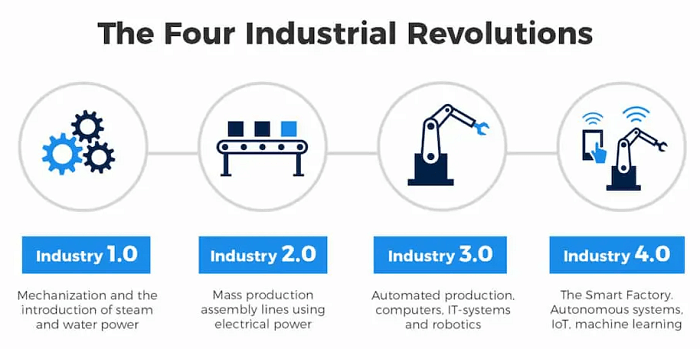AI in Manufacturing Industry
Artificial intelligence (AI) is transforming the manufacturing industry, enabling companies to optimize production, improve quality, and reduce costs.
One way AI is being used in manufacturing is through the use of robots. These robots can be programmed to perform tasks with a high degree of accuracy and consistency, and they can work around the clock without needing breaks. This can help manufacturers increase productivity and reduce the risk of errors.
Another way AI is being used in manufacturing is through the analysis of data. By collecting data from sensors on production equipment, AI algorithms can identify patterns and predict when equipment is likely to fail. This can help manufacturers improve the reliability of their equipment and reduce downtime.
AI is also being used to optimize production processes. For example, AI algorithms can analyze data from different stages of production and identify bottlenecks or inefficiencies. This can help manufacturers improve the flow of materials and reduce waste.
AI is also being used to improve the quality of products. By analyzing data from past production runs, AI algorithms can identify patterns that are indicative of defects. This can help manufacturers proactively identify problems and prevent them from occurring in the future.
In addition to these benefits, AI is also helping manufacturers reduce costs. By automating tasks, manufacturers can reduce labor costs and improve efficiency. In addition, AI can help manufacturers reduce energy costs by optimizing equipment usage and identifying opportunities for energy conservation.
Overall, AI is having a significant impact on the manufacturing industry. By enabling companies to optimize production, improve quality, and reduce costs, AI is helping manufacturers stay competitive in a rapidly changing global marketplace.
Applications of AI in Manufacturing Industry

There are several applications of artificial intelligence (AI) in the manufacturing industry, including:
- Robotic automation: AI is being used to program robots to perform tasks with a high degree of accuracy and consistency. These robots can work around the clock without needing breaks, helping manufacturers increase productivity and reduce the risk of errors.
- Predictive maintenance: By collecting data from sensors on production equipment, AI algorithms can identify patterns and predict when equipment is likely to fail. This can help manufacturers improve the reliability of their equipment and reduce downtime.
- Process optimization: AI algorithms can analyze data from different stages of production and identify bottlenecks or inefficiencies. This can help manufacturers improve the flow of materials and reduce waste.
- Quality control: By analyzing data from past production runs, AI algorithms can identify patterns that are indicative of defects. This can help manufacturers proactively identify problems and prevent them from occurring in the future.
- Supply chain optimization: AI can be used to analyze data from the supply chain to identify opportunities for cost savings and improve the flow of materials.
- Energy management: AI can help manufacturers optimize energy consumption and identify opportunities for energy conservation.
- Personalization: AI can be used to customize products for individual customers, enabling manufacturers to offer a higher level of personalization.
- Predictive analytics: AI can be used to forecast demand for products, helping manufacturers optimize production and inventory management.
Limitations of Applications of AI in Manufacturing Industry
There are several limitations to the applications of artificial intelligence (AI) in the manufacturing industry:
- Cost: Implementing AI in manufacturing can be expensive, as it requires the purchase of new technology and training for employees.
- Lack of data: In order for AI algorithms to be effective, they need access to large amounts of data. If a manufacturing company does not have access to sufficient data, it may be difficult for them to fully utilize AI.
- Ethical concerns: There are concerns about the potential negative impact of AI on employment, as it may replace human workers with automation.
- Bias in data: If the data used to train AI algorithms is biased, the algorithms may make decisions that are biased as well.
- Limited capabilities: While AI can perform tasks with a high degree of accuracy and consistency, it is not capable of creativity or independent thought.
- Security: AI systems can be vulnerable to cyberattacks, which could have serious consequences in the manufacturing industry.
- Regulatory issues: There may be regulatory issues to consider when implementing AI in the manufacturing industry, such as data privacy laws.
|

 For Videos Join Our Youtube Channel: Join Now
For Videos Join Our Youtube Channel: Join Now









